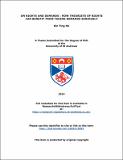Files in this item
On rights and demands : how theorists of rights can benefit from taking demands seriously
Item metadata
| dc.contributor.advisor | Cruft, Rowan | |
| dc.contributor.author | Ho, Kin Ting | |
| dc.coverage.spatial | 255 | en_US |
| dc.date.accessioned | 2014-12-08T15:15:31Z | |
| dc.date.available | 2014-12-08T15:15:31Z | |
| dc.date.issued | 2014-12-01 | |
| dc.identifier.uri | https://hdl.handle.net/10023/5892 | |
| dc.description.abstract | This thesis explores the normative significance of making a rights-backed, authorized demand as a right holder. Rights, I argue, enable their holders to make a special kind of demand which comes with a special force. It is, in other words, one of rights’ functions that they are demands-enabling. I single out what sort of demands I am interested in exploring. I also look at how these special demands are normatively significant. I call them rights-backed, authorized demands. They are normatively significant, first, because of the interesting role they play in other agents’ practical-reasoning, and , second, because the very making of these demands, as a matter of rights, is empowering in an abstract way. I go on to contrast my view with other ‘demand theories’ in existence and conclude that my view is substantively different. In particular, existing demand theories of rights all fail to sufficiently highlight the importance of actual demands, and instead focus on the ‘status’ of ‘being in a position’ to make demands. I argue that this focus is a fundamental mistake. I also consider how my view can contribute to some related literature on rights. First, I argue that my view highlights a new function which rights have: it has interesting implications on the shape of the long-standing debate between the will and interest theory of rights. Second, I argue that my view provides us with a new way to counter one of the most discussed criticisms of the existence of welfare human rights, which is the argument that rights must correlate with some specific duties as a necessary existence condition, and that human welfare rights fail on this mark. I conclude that if human rights indeed have a demand-related function as I argue, it weakens the intuitive appeal of this criticism. | en_US |
| dc.language.iso | en | en_US |
| dc.publisher | University of St Andrews | |
| dc.subject | Theory of rights | en_US |
| dc.subject | Theory of human rights | en_US |
| dc.subject | Moral philosophy | en_US |
| dc.subject | Political philosophy | en_US |
| dc.subject | Demand theory of rights | en_US |
| dc.subject.lcc | JC571.H6 | |
| dc.subject.lcsh | Human rights--Philosophy | en_US |
| dc.subject.lcsh | Ethics | en_US |
| dc.subject.lcsh | Political science--Philosophy | en_US |
| dc.title | On rights and demands : how theorists of rights can benefit from taking demands seriously | en_US |
| dc.type | Thesis | en_US |
| dc.type.qualificationlevel | Doctoral | en_US |
| dc.type.qualificationname | PhD Doctor of Philosophy | en_US |
| dc.publisher.institution | The University of St Andrews | en_US |
| dc.publisher.department | University of Stirling | en_US |
This item appears in the following Collection(s)
Items in the St Andrews Research Repository are protected by copyright, with all rights reserved, unless otherwise indicated.

